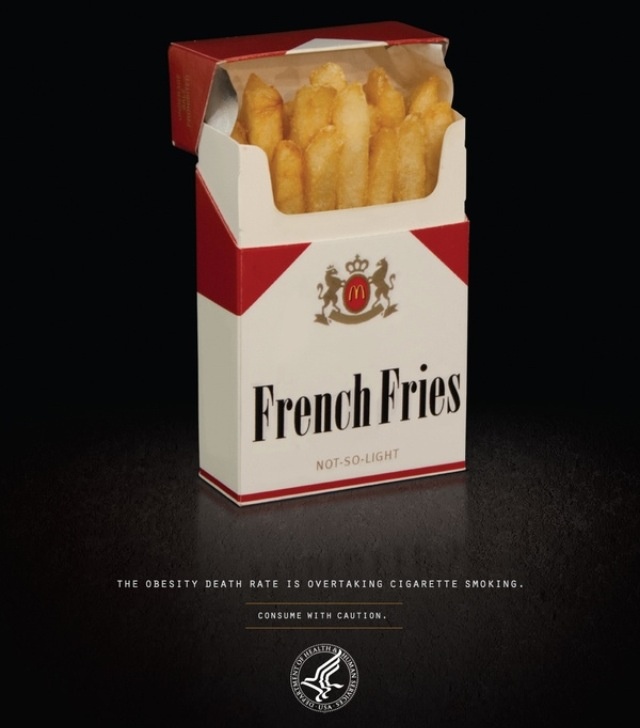Do Fast Food Ads Hold the Same Risks as Tobacco Ads?
May 4, 2017
We live in a society of capitalism, and with capitalism comes advertisement. Advertisements are everywhere you look: Billboards, between radio songs, across social media, in forty-five second TV commercials…Turn your head in either direction and you will see an advertisement for something.
After years of scientific research proving the harmful effects of cigarettes, the U.S. Congress banned public tobacco advertisements in 1970. In the years previous to this ban, tobacco producers depicted young and healthy men and women smoking, making everything researches warned against seem harmless. Cigarettes were oftentimes advertised as something you just had to try, much like fast food is advertised today.

In more recent years, fast food corporations have glorified lower quality, “bargain” foods, and immense portion sizes, such as “Super Size Meals.” These encouragements of bad dieting are promoting a deadly lifestyle. The United States is currently the most obese country in North America. The Campaign for a Commercial-Free Childhood (CCFC) has come to together to address the health crisis of childhood obesity and its direct connection to the media. Within the past thirty years alone, the children obesity rate has quadrupled due to the 98% of televised food advertisements children see for snacks and meals that contain high levels of sugar, fat, and sodium. According to CCFC, “In 2006, more than 80 different media programs were used to promote food to children through brand licensing or toy giveaways. That same year fast food restaurants sold more than 1.2 billion kids meals with toys.”
The flavor enhancers used that make fast food so cheap have been proven to have highly addictive qualities, and that is why when you eat In-N-Out one night, your body craves it the next. Monosodium Glutamate, or MSG, is an ingredient you can see in nearly any fast-food menu item. MSG is a cheap ingredient that allows producers to use low-quality foods without being able to taste much of a difference. It is because of this substance you are able to eat a super-sized #1 combo meal, and still have room for a milkshake: MSG interferes with appetite suppression and causes us to feel hungry even after eating large amounts of food. The protein compound, Casein, also referred to as the “nicotine of fast food”, is another highly addictive substitute in fast food. Casein activates your opioid system, which is directly associated with addictive behavior.
With America’s obesity rate steadily rising, it is no wonder questions are being directed towards the super-sized advertisements, and evidence proves that reasonable assumptions are being made.












jace w • Apr 1, 2022 at 1:29 pm
did a paper with your ad for college.